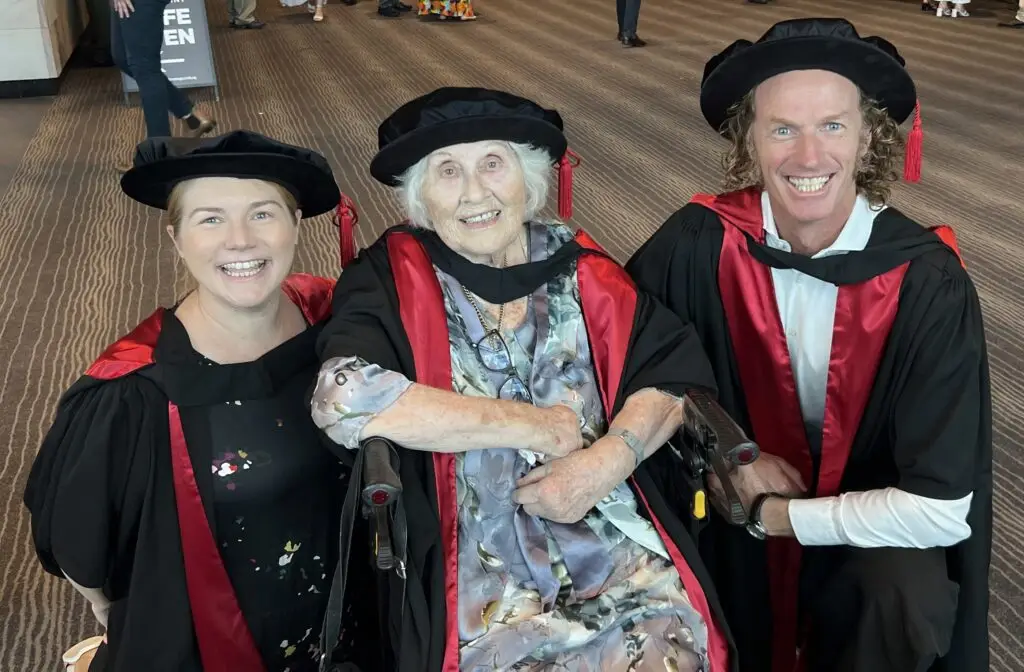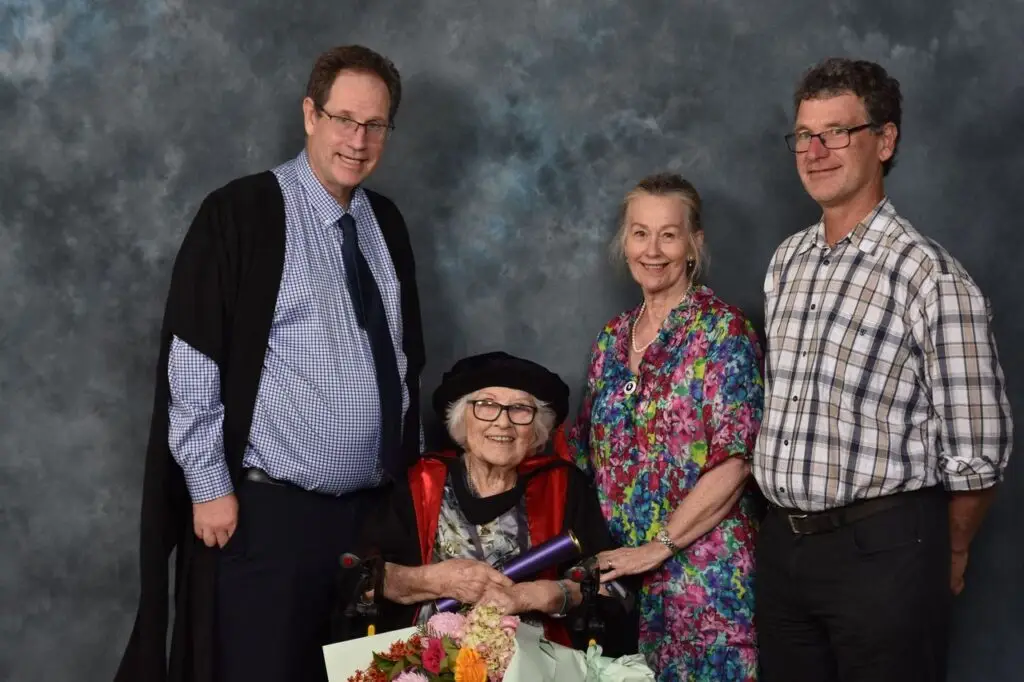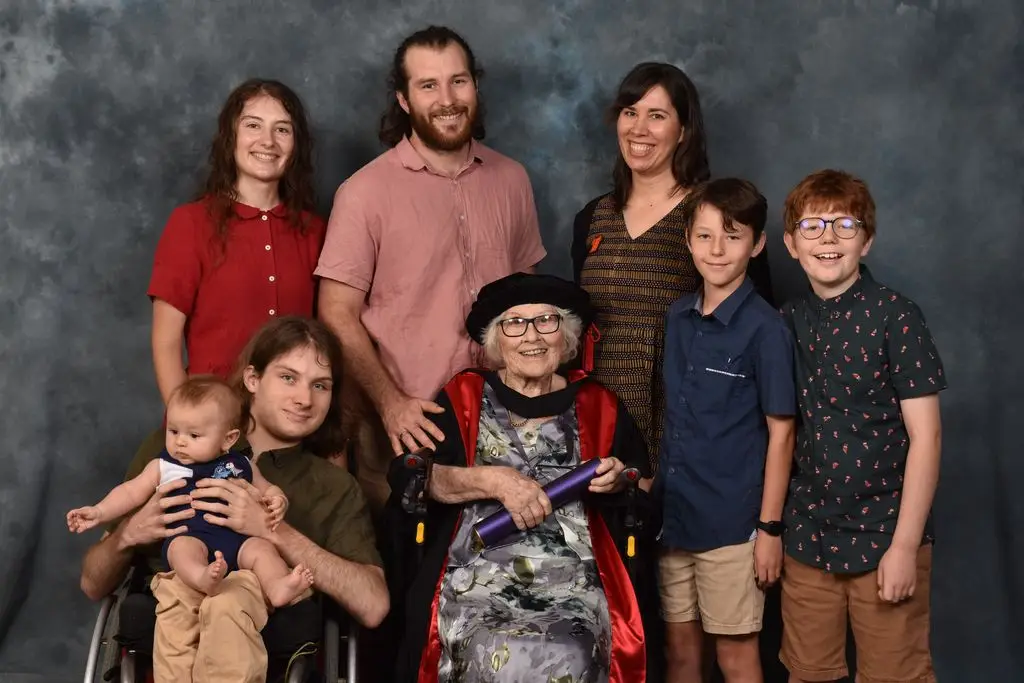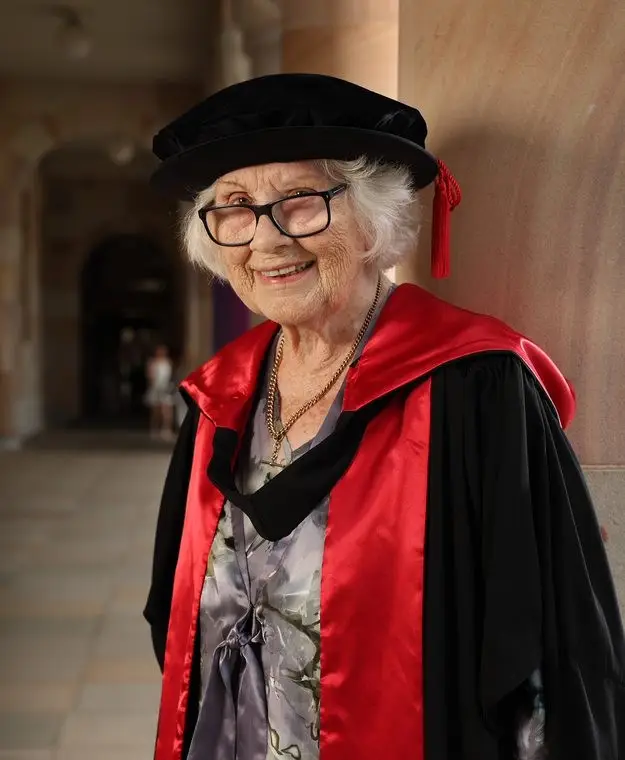Dr Bronwyn Herbert’s remarkable achievement of earning her PhD at the age of 90 has captured the attention of media outlets worldwide. Her story was recently featured in The Guardian’s piece about inspirational nonagenarians, in radio interviews with the Australian Broadcasting Corporation, and in the University of Queensland’s celebration of their PhD graduate who ‘proves age is no barrier’. In this interview, we delve deeper into Dr Herbert’s motivations, hardships and what we can learn from her inspiring journey.
Why a PhD Now?
After six decades in the field of social work helping families in crisis, and achieving numerous awards throughout her career, Bronwyn retired at 81 to have time to pursue her PhD research, which she’d been encouraged to consider during her master’s degree. Passionate about improving life outcomes for homeless families, Bronwyn saw gaps in knowledge about preventing intergenerational homelessness and its impact on children. These are gaps she has successfully filled through interviewing participants who had been homeless as children – from the same community in Wynnum-Manly where she’d worked all those years – about how they felt homelessness had affected them in their schooling, employment, relationships and housing. Being retired created a valuable separation between her roles as social worker and researcher. Bronwyn’s PhD findings highlight the importance of parenting and education for much-improved outcomes in homeless children’s lives. She looks forward to opportunities to present her work locally and virtually – and is encouraged by her grandson to write a book entitled ‘Dr Nanny’!
Completing a PhD has contributed another fulfilling chapter to her lifelong learning and acquisition of knowledge: ‘There is so much knowledge waiting for us to discover and learn about. I found that continuing with learning kept me mentally alert and aware of the world around me. I feel it keeps us feeling younger as we develop new interests, gain more knowledge and keep aware of our environment, providing a fulfilling life as we age’. Time passes regardless of how we choose to spend it, so we might as well choose what fulfils us. Bronwyn feels great relief at having completed what she set out to do – the dream of every PhD student!
Why Social Work?
Our early life experiences undoubtedly influence our choices in our academic work, and Bronwyn is no exception. Growing up in a caring Christian family, she observed her father who owned a suburban store providing groceries and children’s clothing to unemployed families, and her mother cooked meals for elderly people she knew who were struggling to live alone before Meals on Wheels was developed in their district. They modelled the importance of caring for others.
On her 23rd birthday, Bronwyn’s medical student husband died while she was pregnant with their daughter. After giving birth, the hospital placed her in a room at the end of the ward opposite a room with a young mother who had lost her baby: ‘She heard my baby and I saw her husband visiting her. No social workers were available to help people in grief at that time,’ Bronwyn recounts. She returned to live with her family, and her brother, who was lecturing at the University of Queensland, informed her about a Social Work course commencing at the university. A few years later, Bronwyn enrolled part-time in the course, and so began her sixty-five years in the social work field.
Surrounded by Support
As Bronwyn commenced her PhD, there was careful consideration given to the scope and feasibility of her proposed project. However, once established onto the PhD programme, she was surrounded by encouragement to keep working on her thesis; age was no barrier for her to thrive in her new adventure as a PhD student. She credits her supervisors, the University of Queensland’s Social Work department, and the librarians as invaluable sources of support. Having supportive and accommodating supervisors is essential to the success of a PhD later in life, Bronwyn advises, along with confidence that one’s health is good enough to pursue ‘this momentous task’.
Her family, too, have been wonderfully supportive. As Bronwyn’s mobility declined, her daughter would drive her to campus for supervision sessions (before they transitioned to Zoom meetings, which she could digitally record and replay). Her son helped her download PDFs, navigate the IT systems and prepare her Sony Dictaphone ready for her fieldwork. Personal support from a local IT technician also aided her in purchasing a new laptop (which lasted the full decade of her PhD), fixing problems at short notice, and setting up the necessary software, including NVivo for analysing her interview data. Bronwyn gained digital literacy skills in word processing, spreadsheets and emails through her work as a social worker and undertaking her master’s degree in the 1990s. Her only technological regret is collating all her thesis references manually instead of using reference management software – relatable to many of us!
On graduation day, the audience erupted into great cheers as Bronwyn received her doctorate from the edge of the stage, reflecting the warm support she received from the university community. The uni even hosted her family in the VIP Room on campus to celebrate! You can watch the special moment in her graduation video below.
Bronwyn is pictured below with two of her three supervisors. Their pride in her is palpable in their big smiles. Her third supervisor sadly died weeks before her graduation.

Heartbreaking Setbacks
Bronwyn’s PhD journey took much longer than she’d originally intended, which is a common reality for many PhD students, but the life events she experienced were profound. The death of her social worker son caused her to have a period where she lost interest in writing for a time. The declining physical health and death of her husband, who always encouraged her to keep going, similarly took its toll on her. She also had to stop working on her thesis during stays in hospital for a heart operation and following a fall.
How did Bronwyn regain her interest in the PhD after suffering these heartbreaks and health scares? She thought about the results of the interviews and her participants’ important stories that she knew needed to be followed up: her commitment to do her participants justice kept her going. Her supervisors were instrumental in inspiring her to continue with her work during the difficult times. A PhD doesn’t occur in a vacuum; life continues around it, so it’s normal for motivation to wax and wane, especially as significant life events occur. Bronwyn shows us that the important thing is to reconnect with your goals and keep pushing onwards whenever you can. Her ability to thrive and succeed has been hard-won through steady perseverance and grit.
Families First
Putting her family’s needs first in her busy life was always a priority, organising her time so that she was available to attend to their needs whilst also attending to important matters in her social work practice. Seeing as her children were older during the period she was attending to her thesis, Bronwyn was able to strike a good work-life balance, and didn’t receive any complaints!
She is pictured below at her PhD graduation with her children and grandchildren. She feels happy in having inspired them to pursue education themselves. All four of her children followed her lead and were involved in caring professions – two teachers, a social worker, and a medical doctor.
Bronwyn keenly feels the discrepancy between her own high expectations for her children and the different opportunities for the children of her clients in crisis. She is proud of the extraordinary achievements that some of the participants in her research made despite their homeless background: three obtained university degrees, three are conducting their own businesses and others are achieving well in their personal lives. Bronwyn’s passion for improving the life outcomes of homeless children has clearly touched countless lives throughout her career, culminating in her PhD research, and the legacy for positive social change lives on through her family.


We would like to give our heartfelt thanks to Bronwyn for sharing her story with us, and to her son Anthony for sharing her wonderful graduation photos and video.




